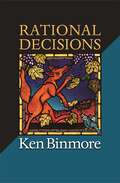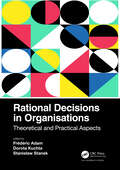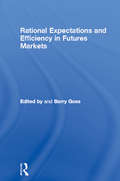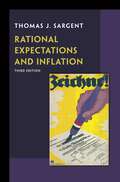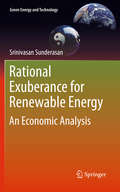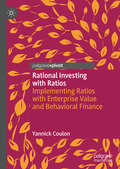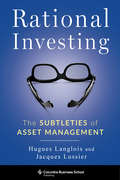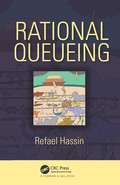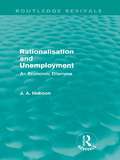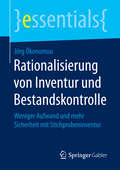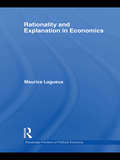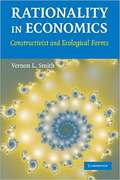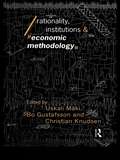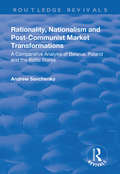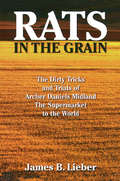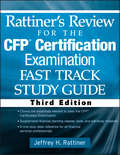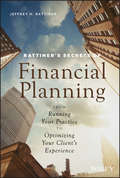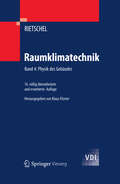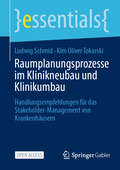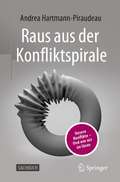- Table View
- List View
Rational Choice
by Itzhak GilboaA nontechnical, concise, and rigorous introduction to the rational choice paradigm, focusing on basic insights applicable in fields ranging from economics to philosophy. This book offers a rigorous, concise, and nontechnical introduction to some of the fundamental insights of rational choice theory. It draws on formal theories of microeconomics, decision making, games, and social choice, and on ideas developed in philosophy, psychology, and sociology. Itzhak Gilboa argues that economic theory has provided a set of powerful models and broad insights that have changed the way we think about everyday life. He focuses on basic insights of the rational choice paradigm—the general conceptualization rather than a particular theory—that survive recent (and well-justified) critiques of economic theory's various failures. Gilboa explains the main concepts in language accessible to the nonspecialist, offering a nonmathematical guide to some of the main ideas developed in economic theory in the second half of the twentieth century. Chapters cover feasibility and desirability, utility maximization, constrained optimization, expected utility, probability and statistics, aggregation of preferences, games and equilibria, free markets, and rationality and emotions. Online appendixes offer additional material, including a survey of relevant mathematical concepts.
Rational Choice and Managerial Decision-Making
by Willy ShihThis note discusses Herbert Simon's notion of bounded rationality: how managers may sometimes make suboptimal choices because of their limited ability to access or process information.
Rational Decision and Causality
by Ellery EellsFirst published in 1982, Ellery Eells' original work on rational decision making had extensive implications for probability theorists, economists, statisticians and psychologists concerned with decision making and the employment of Bayesian principles. His analysis of the philosophical and psychological significance of Bayesian decision theories, causal decision theories and Newcomb's paradox continues to be influential in philosophy of science. His book is now revived for a new generation of readers and presented in a fresh twenty-first-century series livery, including a specially commissioned preface written by Brian Skyrms, illuminating its continuing importance and relevance to philosophical enquiry.
Rational Decisions (The Gorman Lectures in Economics #4)
by Ken BinmoreIt is widely held that Bayesian decision theory is the final word on how a rational person should make decisions. However, Leonard Savage--the inventor of Bayesian decision theory--argued that it would be ridiculous to use his theory outside the kind of small world in which it is always possible to "look before you leap." If taken seriously, this view makes Bayesian decision theory inappropriate for the large worlds of scientific discovery and macroeconomic enterprise. When is it correct to use Bayesian decision theory--and when does it need to be modified? Using a minimum of mathematics, Rational Decisions clearly explains the foundations of Bayesian decision theory and shows why Savage restricted the theory's application to small worlds. The book is a wide-ranging exploration of standard theories of choice and belief under risk and uncertainty. Ken Binmore discusses the various philosophical attitudes related to the nature of probability and offers resolutions to paradoxes believed to hinder further progress. In arguing that the Bayesian approach to knowledge is inadequate in a large world, Binmore proposes an extension to Bayesian decision theory--allowing the idea of a mixed strategy in game theory to be expanded to a larger set of what Binmore refers to as "muddled" strategies. Written by one of the world's leading game theorists, Rational Decisions is the touchstone for anyone needing a concise, accessible, and expert view on Bayesian decision making.
Rational Decisions in Organisations: Theoretical and Practical Aspects
by Frédéric AdamManagers in organisations must make rational decisions. Rational decision making is the opposite of intuitive decision making. It is a strict procedure utilising objective knowledge and logic. It involves identifying the problem to solve, gathering facts, identifying options and outcomes, analysing them, considering all the relationships and selecting the decision. Rational decision making requires support: methods and software tools. The identification of the problem to solve needs methods that would measure and evaluate the current situation. Identification and evaluation of options and analysis of the available possibilities involves analysis and optimisation methods. Incorporating intuition into rational decision making needs adequate methods that would translate ideas or observed behaviours into hard data. Communication, observation and opinions recording is hardly possible today without adequate software. Information and data that form the input, intermediate variables and the output must be stored, managed and made accessible in a user-friendly manner. Rational Decisions in Organisations: Theoretical and Practical Aspects presents selected recent developments in the support of the widely understood rational decision making in organisations, illustrated through case studies. The book shows not only the variety of perspectives involved in decision making, but also the variety of domains where rational decision support systems are needed. The case studies present decision making by medical doctors, students and managers of various universities, IT project teams, construction companies, banks and small and large manufacturing companies. Covering the richness of relationships in which the decisions should and must be taken, the book illustrates how modern organisations operate in chains and networks; they have multiple responsibilities, including social, legal, business and ethical duties. Nowadays, managers in organisations can make transparent decisions and consider a multitude of stakeholders and their diverse features, incorporating diverse criteria, using multiple types and drivers of information and decision-making patterns, and referring to numerous lessons learned. As the book makes clear, the marriage of theoretical ideas with the possibilities offered by technology can make the decisions in organisations more rational and, at the same time, more human.
Rational Expectations and Efficiency in Futures Markets
by Barry A. GossDo traders in futures markets make use of all relevant information and is this reflected in prices? This collection of original essays by a team of international economists considers these and other questions central to futures markets.
Rational Expectations and Inflation: Third Edition
by Thomas J. SargentA fully expanded edition of the Nobel Prize–winning economist's classic bookThis collection of essays uses the lens of rational expectations theory to examine how governments anticipate and plan for inflation, and provides insight into the pioneering research for which Thomas Sargent was awarded the 2011 Nobel Prize in economics. Rational expectations theory is based on the simple premise that people will use all the information available to them in making economic decisions, yet applying the theory to macroeconomics and econometrics is technically demanding. Here, Sargent engages with practical problems in economics in a less formal, noneconometric way, demonstrating how rational expectations can satisfactorily interpret a range of historical and contemporary events. He focuses on periods of actual or threatened depreciation in the value of a nation's currency. Drawing on historical attempts to counter inflation, from the French Revolution and the aftermath of World War I to the economic policies of Margaret Thatcher and Ronald Reagan, Sargent finds that there is no purely monetary cure for inflation; rather, monetary and fiscal policies must be coordinated.This fully expanded edition of Rational Expectations and Inflation includes Sargent's 2011 Nobel lecture, "United States Then, Europe Now." It also features new articles on the macroeconomics of the French Revolution and government budget deficits.
Rational Exuberance
by Michael J. MandelMichael J. Mandel, chief economist of BUSINESSWEEK is the country's most passionate partisan for exuberant economic growth. In the mid-1990s, he was one of the first journalists to use the term "New Economy" to describe the fast-growing but volatile U.S. economy, supercharged by technology and finance. Mandel's understanding of the true underpinnings of the 1990s economy led to his prescient warning that the Internet bubble was about to burst, which he predicted in his book THE COMING INTERNET DEPRESSION. Now Mandel is issuing another warning. Without exuberant, technology-driven growth, the U.S. economy will lack the firepower to solve its social problems. Without breakthrough innovations like the internal combustion engine or the Internet, the U.S. economy simply can't create enough jobs or wealth to provide for its citizenry. Yet exuberant growth is stigmatized as immoral by some and bad public policy by others. And economists, surprisingly enough, are the biggest enemies of innovative, transformative growth. Mandel, a Ph.D. in economics himself, believes his colleagues in the dismal profession are a big part of the problem. Focusing on what he labels the single biggest failure in modern economics, Mandel blames NEW YORK TIMES columnist Paul Krugman, Nobel laureate Milton Friedman, and Greg Mankiw, President Bush's head of the Council of Economic Advisers, for misleading generations of students and slanting public policy against scientific innovation. Lively, opinionated, and controversial, Mandel's thinking will serve as a rallying cry for the creation of a new political coalition dedicated to economic growth. He calls on Silicon Valley to take their case to Washington, and to shift the debate from arguing about trade and budget deficits to solutions, such as more support for research, start-ups, and workforce training. Mandel is sure to kick-start that debate
Rational Exuberance for Renewable Energy
by Srinivasan SunderasanRational Exuberance for Renewable Energy is a beyond-the-hype account of the underlying issues that encourage or plague widespread dissemination of renewable energy (RE) technologies. Renewable energy operates in the real world, and it cannot be assumed that the conventional theories and incentive structures of economics and business do not apply. The author argues that grants and subsidies could be provided to support research, development and technology improvement efforts, but should not be employed as an instrument of state policy to intervene in specific markets. It is important to recognize that although investors often demonstrate an appetite for market risk, they find technology risks and policy uncertainty much less appealing. Rational Exuberance for Renewable Energy blends classical economic theory with the everyday realities of the RE industry to identify incentive structures contributing to the success - or otherwise - of project implementation involving renewable sources and appropriate technologies. The book is a compilation of articles that analyze individual RE technologies, and offer multiple perspectives of the RE industry and markets. Rational Exuberance for Renewable Energy is intended for policy makers, advanced students of energy economics and sustainable development, and for potential mainstream investors.
Rational Investing with Ratios: Implementing Ratios with Enterprise Value and Behavioral Finance
by Yannick CoulonExplaining the underlying logic behind financial ratios, this book adds to the discussion on the importance and implementation of ratios and illustrates the essential role that they play in company evaluations and investment screening. The author explores how ratios establish a proportional relationship between accounting and market data, and when well-integrated into a global company vision, can become powerful indicators capable of outlining relevant information and identifying warning signs. Going beyond merely listing possible ratios and looking further into their implementation, each ratio family is demonstrated with numerous graphs and practical case studies involving companies such as Amazon, Walmart and Alibaba. With a focus on behavioral finance and enterprise value, this innovative Palgrave Pivot will be of interest to investors, bankers and entrepreneurs, as well as finance scholars and students.
Rational Investing: The Subtleties of Asset Management (Columbia Business School Publishing)
by Jacques Lussier Hugues LangloisMany investors believe that success in investing is either luck or clairvoyance. In Rational Investing, finance professor Hugues Langlois and asset manager Jacques Lussier present the current state of asset management and clarify the conundrum of luck versus skill. The core of Rational Investing is a framework for smart investing built around three performance drivers: balancing exposure to risk factors, efficiently diversifying bad luck, and taking advantage of relative mispricings in financial markets. With clear examples from model multi-asset-class portfolios, Langlois and Lussier show how to implement performance drivers like institutional investors with access to extensive resources, as well as nonprofessional investors who are constrained to small-scale transactions. There are few investment products, whether traditional or alternative, discretionary or systematic, fundamental or quantitative, whose performance cannot be analyzed through this framework. Langlois and Lussier illuminate the structure of financial markets and the mechanics of sustainable investing so any investor can become a rational player, from the nonprofessional investor with a basic knowledge of statistics all the way to seasoned investment professionals wishing to challenge their understanding of the asset management industry.
Rational Queueing (Chapman & Hall/CRC Series in Operations Research)
by Refael HassinUnderstand the Strategic Behavior in Queueing SystemsRational Queueing provides one of the first unified accounts of the dynamic aspects involved in the strategic behavior in queues. It explores the performance of queueing systems where multiple agents, such as customers, servers, and central managers, all act but often in a noncooperative manner.T
Rationalisation and Unemployment: An Economic Dilemma (Routledge Revivals)
by J. A. HobsonFirst published in 1930, John Hobson’s study deals with the economic dilemmas generated in the early twentieth century by the advent of mass production. Namely the over-production and surfeit of goods and the resultant failure of the expansion of markets leading to record levels of mass unemployment. Seeking a solution to this dilemma, Hobson analyses all aspects of the problem: income, uses of the surplus, underconsumption, markets and distribution, and internationalism. The study also explores theories concerning economies of rationalisation, both in terms of productivity and consumption.
Rationalisierung von Inventur und Bestandskontrolle: Weniger Aufwand und mehr Sicherheit mit Stichprobeninventur (essentials)
by Jörg ÖkonomouJörg Ökonomou veranschaulicht praxisnah, wie sich mit statistischen Verfahren der Zählaufwand im Vergleich zur Vollinventur erheblich verringern lässt und sich Aufnahmefehler gleichzeitig minimieren. Dieses essential zeigt die Optionen und Umsetzungsmöglichkeiten der Methoden auf, die auch für unterjährige Bestandskontrollen ein erheblich effizienteres Mittel als das konventionelle Vorgehen sind. Es ist kein Statistik-Buch, sondern es ist gedacht für Praktiker, die Inventur- und Bestandskontrollprozesse optimieren wollen.
Rationality and Explanation in Economics (Routledge Frontiers Of Political Economy Ser.)
by Maurice LagueuxEconomical questions indisputably occupy a central place in everyday life. In order to clarify these questions, people generally turn to those who are familiar with economics. In answering such legitimate questions, economists propose explanations which rest on a few principles among which the rationality principle is by far the most fundamental. This principle assumes that people are rational, but what is meant by this has to be specified. Rationality and Explanation in Economics claims that only a minimal kind of rationality is required to ‘animate’ economic explanations. However, such a conception of rationality faces serious objections: it is closely associated with harshly criticised methodological individualism and it is not easily disentangled from sheer irrationality. The book answers these objections and shows that the economists’ way of mobilising the concepts of maximization or of consistency for defining rationality raises more serious problems. Since the latter have encouraged various attempts to downgrade or even to dispense with the very notion of rationality, the book is largely devoted to countering arguments associated with these attempts and to show why postulating that agents are rational is still the only efficient way to explain economic phenomena as such. The author also proposes original views about the role of rationality, the meaning of methodological individualism, the relevance of the selection argument and the relation between ‘rational’ explanations of economics and explanations in natural sciences.
Rationality in Economics
by Vernon L. SmithThe principal findings of experimental economics are that impersonal exchange in markets converges in repeated interaction to the equilibrium states implied by economic theory, under information conditions far weaker than specified in the theory. In personal, social, and economic exchange, as studied in two-person games, cooperation exceeds the prediction of traditional game theory. This book relates these two findings to field studies and applications and integrates them with the main themes of the Scottish Enlightenment and with the thoughts of F. A. Hayek: through emergent socio-economic institutions and cultural norms, people achieve ends that are unintended and poorly understood. In cultural changes, the role of constructivism, or reason, is to provide variation, and the role of ecological processes is to select the norms and institutions that serve the fitness needs of societies.
Rationality, Institutions and Economic Methodology (Economics As Social Theory Ser.)
by Uskali Mäki Christian Knudsen Bo GustafssonFirst published in 1993. Routledge is an imprint of Taylor & Francis, an informa company.
Rationality, Nationalism and Post-Communist Market Transformations: A Comparative Analysis of Belarus, Poland and the Baltic States (Routledge Revivals)
by Andrew SavchenkoThis title was first published in 2000: A comparative analysis of market transformation in Poland, Belarus and the Baltic states with particular emphasis on cross-national variations in speed and direction of post-Communist economic reforms. While many studies tend to concentrate on the economic aspects of market reforms, analysis of the broader institutional framework is less common. This book, therefore, focuses on the influence of historical and cultural conditions on the formation of economic policy. The findings presented indicate that, far from being a purely rational process driven exclusively by considerations of economical efficiency, post-Communist market transformation is influenced by socio-political and cultural factors which are able to account for cross-national variations in speed and direction of reforms.
Rats in the Grain: The Dirty Tricks and Trials of Archer Daniels Midland, the Supermarket to the World
by James B. LieberBeneath the wholesome image of Archer Daniels Midland lie some of the dirtiest practices in American business: price-fixing, bribery, and cover-ups. Unfolding like a legal thriller, Rats in the Grain portrays the crime and punishment of ADM during the largest white-collar criminal trial of the 1990s. James Lieber profiles the witnesses, the defense lawyers and federal prosecutors, the inner workings of the Justice Department's Antitrust Division, and the unpredictable mole Lieber had access to. "A detailed account of how an influential corporation can go rotten. " - The Cleveland Plain Dealer
Rattiner's Review for the CFP(R) Certification Examination, Fast Track, Study Guide
by Rattiner Jeffrey H.The proven CFP Study Guide that delivers just what you need to succeed! A quick-study guide for candidates preparing to take the CFP Certification Examination, Rattiner's Review for the CFP® Certification Examination distills the bare-bones essentials you need to know to pass this challenging exam, all in a logical and easy-to-absorb manner. This indispensable study tool for students who have already been through traditional CFP educational programming-and just need a little extra help pulling it all together-provides a no-nonsense approach to studying for some of the most important disciplines of financial planning, including: PFP, insurance, employee benefit, investments, income tax, retirement, and estate planning. Each discipline contains short and concise statements emphasizing key points through mnemonic devices, study tips, and other established test-taking methods that provide helpful hints. Rattiner's Review for the CFP® Certification Examination, Third Edition has been thoroughly updated to include: Reviews from recent CFP Exam students who compare the CFP Board curriculum to this Third Edition, ensuring that all topics are covered adequately New, easy-to-follow flowcharts at the beginning of each chapter highlight the macro level perspective of each subject discipline Basic calculator keystrokes for investment math, retirement, life, and education needs analysis, and other important calculations New multiple-choice questions as well as new charts and tables for quick memorizations New acronyms to help put things into a simplified perspective and help students tie back to the big picture flowchart Perfect as a quick-reference guide to complement all CFP texts and self-study materials, it also serves as an important one-stop resource for financial services professionals who want information in a hurry. Stay organized, on track, and focused with Rattiner's Review for the CFP® Certification Examination, Third Edition.
Rattiner's Secrets of Financial Planning: From Running Your Practice to Optimizing Your Client's Experience
by Jeffrey H. RattinerLearn what it takes to be a success from the ‘all-stars’ of the financial planning and advisory profession Financial planning involves everything from determining the client's financial position, cash flow, and investment strategies, to income tax planning, risk management, insurance, and retirement and estate planning. Financial planners and advisors are responsible for recommendations and decisions that help people define and achieve their financial goals. Rattiner's Secrets of Financial Planning gives industry professionals the opportunity to hear and learn from ‘the best of the best’ in the field. Author Jeffrey H. Rattiner, a respected leader in Certified Financial Planning (CFP), shares real-world insights and expert advice from hundreds of top-level advisors in the financial planning industry. Readers gain firsthand knowledge of the challenges these successful planners have faced and how they continue to build their practices and reap success in a dynamic financial environment. This comprehensive resource includes templates based on what the best CFPs use in their practices for work programs, data quantification reports, asset allocation model portfolios, pro forma statements, and checklists for each technical financial planning discipline. Designed specifically for industry professionals, this in-depth book: Offers CFPs and financial advisors proven advice and practical methods to take their practice to the next level Includes contributions from and interviews with the leading advisors in the profession Provides templates taken from the practices of high-level financial advisors Explains the key ingredients for building a superior financial planning practice Helps develop successful financial planners and strengthen profitable practices Rattiner's Secrets of Financial Planning: From Running Your Practice to Optimizing Your Client's Experience is an important resource for CFPs, CPAs, financial advisors, financial planners, and high-level corporate executives working in the financial services industry.
Raumklimatechnik
by Klaus FitznerDas 4-bändige Werk ist die Fortführung des "Leitfadens zum Berechnen und Entwerfen von Lüftungs- und Heizungsanlagen". Für die Neuauflage wurde es völlig neu strukturiert und stärker an einer integrierten Betrachtung des Gebäudes und seiner klimatechnischen Anlagen ausgerichtet. In Band 4 wird das Zusammenwirken von Raumlufttechnik, Energietechnik und Gebäude behandelt. Die Konsequenzen der Energiesparverordnungen und des Erneuerbare-Energien-Wärmegesetzes werden erläutert und der Stand der Technik zur Nutzung regenerativer Energien beschrieben.
Raumplanungsprozesse im Klinikneubau und Klinikumbau: Handlungsempfehlungen für das Stakeholder-Management von Krankenhäusern (essentials)
by Kim Oliver Tokarski Ludwig SchmidAufgrund der erheblichen Investitionssummen und der hohen Versorgungsrelevanz eines Krankenhausneubaus ist die effiziente und nachhaltige Gestaltung des Raumplanungsprozesses von großer Bedeutung. Dabei müssen sowohl die Bedürfnisse der zukünftigen Patient*innen, die sich wandelnden Arbeitsprozesse der Mitarbeitenden wie auch neue Ansätze in Digitalisierung, Technologie und Logistik berücksichtigt werden. Ludwig Schmid und Kim Oliver Tokarski zeigen in diesem Open-Access-Essential sehr praxisnah auf, wie die komplexen Prozesse so gestaltet werden können, dass sie für alle Planungsbeteiligten nachvollziehbar sind und möglichst ressourcenschonend durchgeführt werden können. Dazu geben Sie mit dem Fokus auf die Betriebskonzepte 10 klare Handlungsempfehlungen.
Raus aus dem Regiment der Rollenzuschreibungen: Von weiblicher Ohnmacht zu machtvollen Lösungen in Karriere, Partnerschaft und Familie
by Martina LacknerDieses Buch ist kein gewöhnlicher Ratgeber für Frauen. Es spiegelt schonungslos, was die persönliche Weiterentwicklung von Frauen in Partnerschaft, Familie und Beruf ausbremst – mit messerscharfer Analyse verborgener Wechselwirkungen und Traumata. So können Frauen vorhandene Fallen und Hemmnisse, Ängste, Schuldgefühle und weitere tiefsitzende Emotionen erkennen, um sich im Spagat zwischen Partner*in, Kind und Karriere einen Weg aus dem Gefängnis der Rollenzuschreibungen zu bahnen.Frauen sehen sich oft als Opfer des Patriarchats. Doch dass es ihnen an Bewusstsein für die eigene Macht und an Bereitschaft mangelt, sich diese zuzugestehen, dass Frauen die eigene Macht oft weder wahrnehmen noch akzeptieren, ist für die Autorin der Hauptgrund, warum Frauen in tradierten Rollen bleiben, denn Augenhöhe erfordert souveräne Eigenmacht. Dieses Buch lässt erfahrene Führungsfrauen zu Wort kommen, regt zum Nachdenken an und bietet Lösungswege aus scheinbar schwierigen Situationen. Handlungsempfehlungen für entscheidende Weichenstellungen auf dem Weg zur weiblichen Ermächtigung lassen den Leserinnen keine Rückzugsmöglichkeiten in gewohnte und trainierte Gegenargumente. Ein Buch, das sowohl zur Selbstreflektion anregt wie zur öffentlichen Diskussion.Der Inhalt• Das verborgene Mindset: Der Einfluss der Vergangenheit auf weibliche Karrieren• Am Anfang war die Herkunftsfamilie: Familienkonstellationen und ihre Bedeutung • Pubertät: Die Hormone übernehmen die Führung• Der Spagat beginnt: Partnerschaft, Mutterschaft und Karriere• Führung im Widerstreit: Diskrepanz zwischen Wunsch und Wirklichkeit
Raus aus der Konfliktspirale: Unsere Konflikte - Und wie wir sie lösen
by Andrea Hartmann-PiraudeauDas Thema Konfliktspirale und was passiert mit uns, wenn wir im Konflikt stecken, fasziniert alle gleichermaßen. Die Reaktion ist dann Nachdenklichkeit und Selbstreflektion. Jeder hat eigene Konflikte und deshalb ist uns das Thema nahe. Konflikte sind in der Regel belastend und deshalb wünschen wir uns Erklärungen und Auswege. Welche Dynamik nehmen Konflikte an und wie entwickeln sie sich? Was passiert mit uns, wenn wir in die Konfliktspirale eintreten. Wie verändert sich unser Denken, unsere Sicht auf die Dinge und unsere Interessen? Was macht der Konflikt mit uns und wie kommen wir wieder heraus aus dem Strudel? Darüber handelt dieses Buch. Es basiert auf wissenschaftlichen Erkenntnissen aus der Psychologie und der Konfliktforschung.


